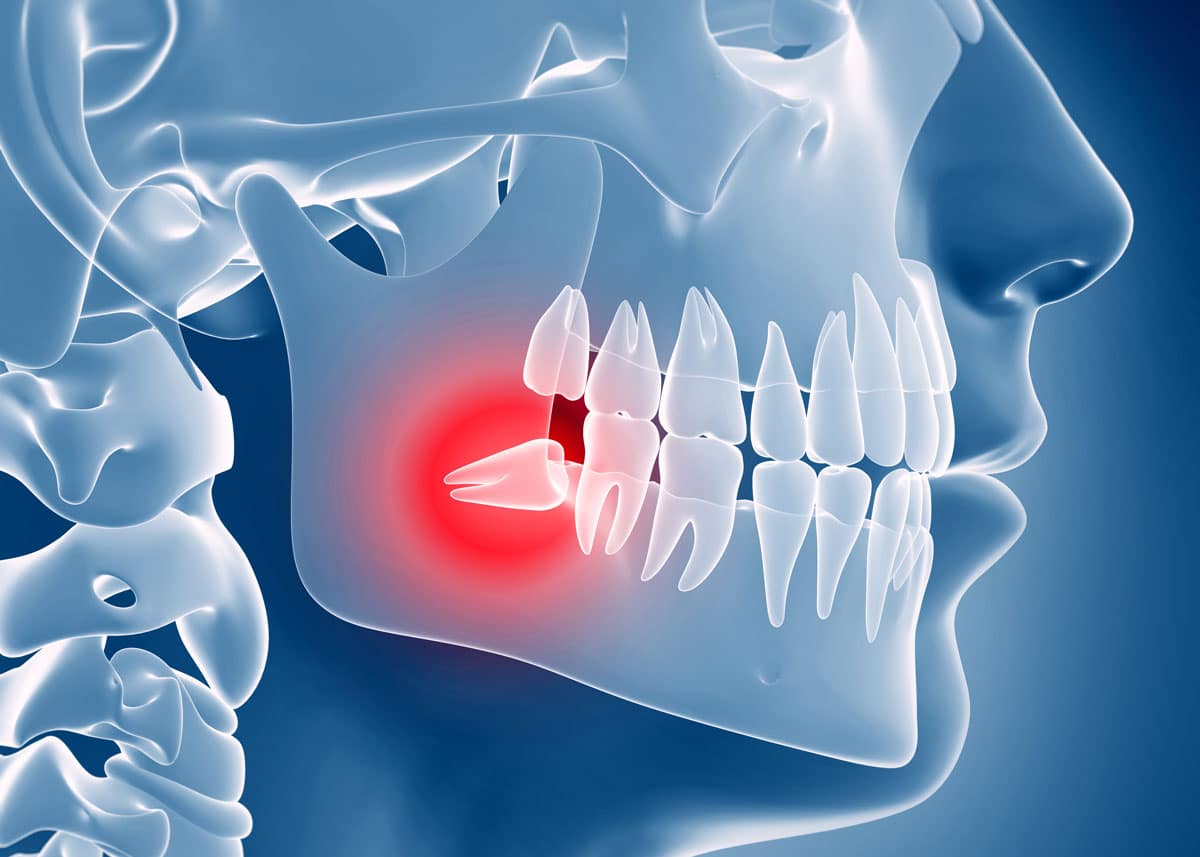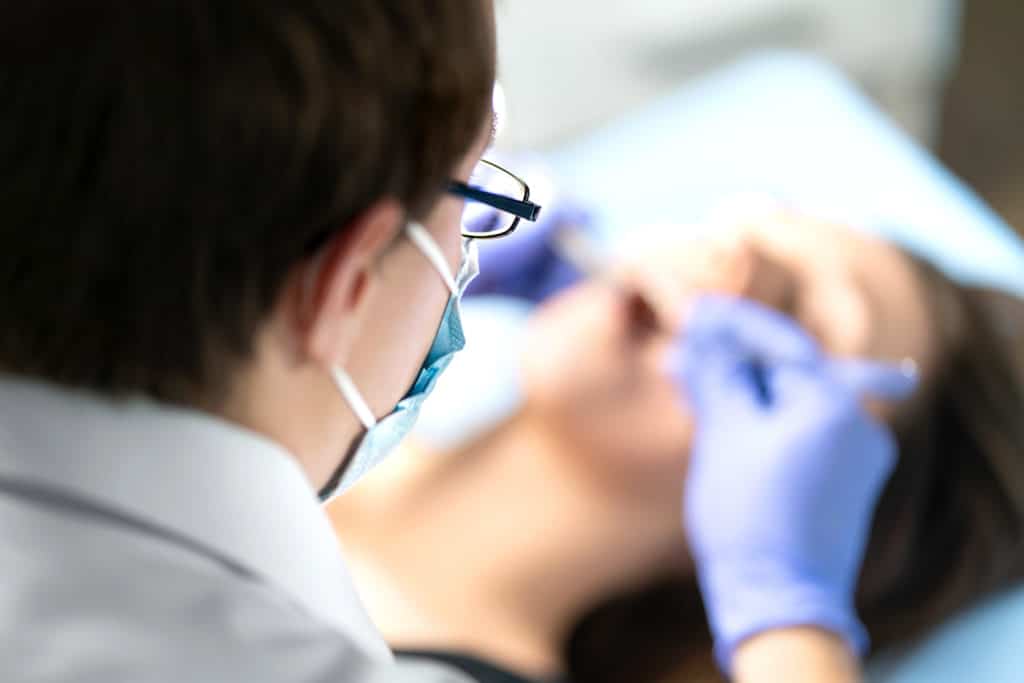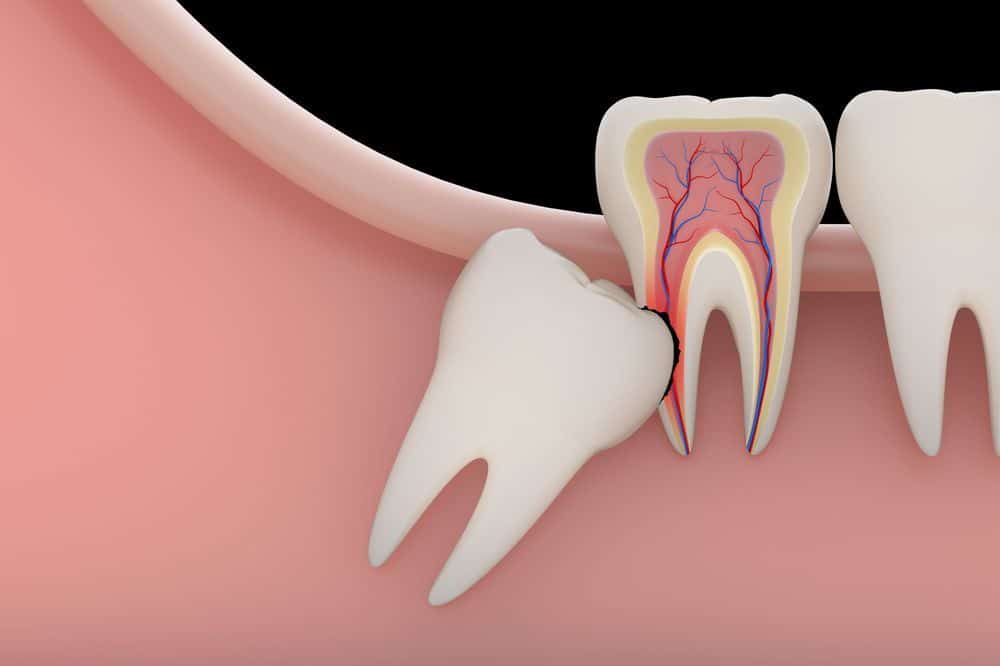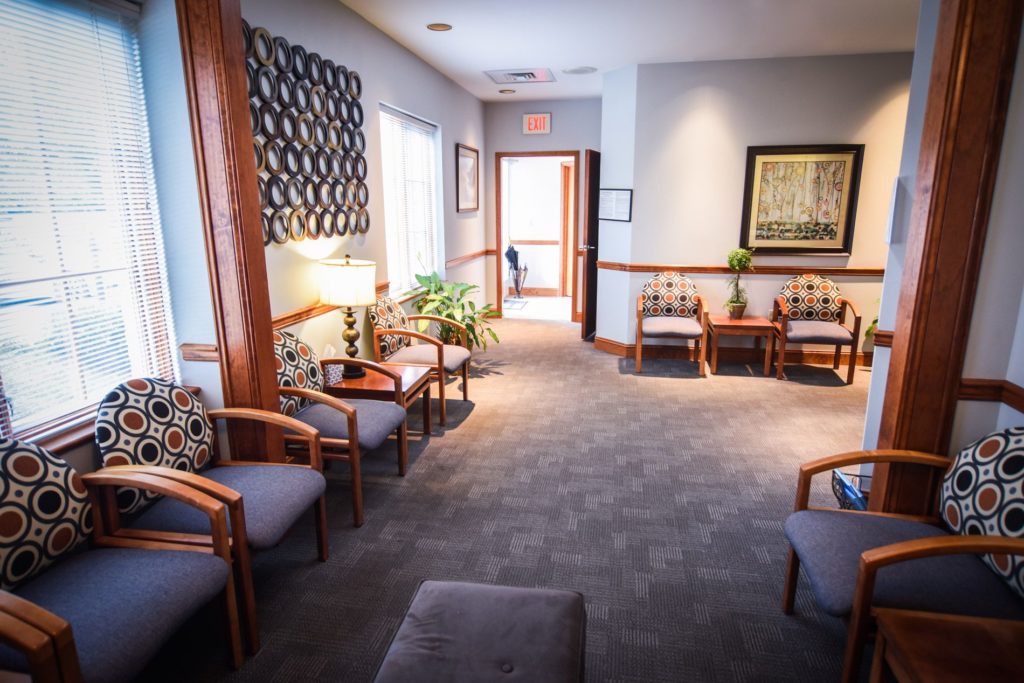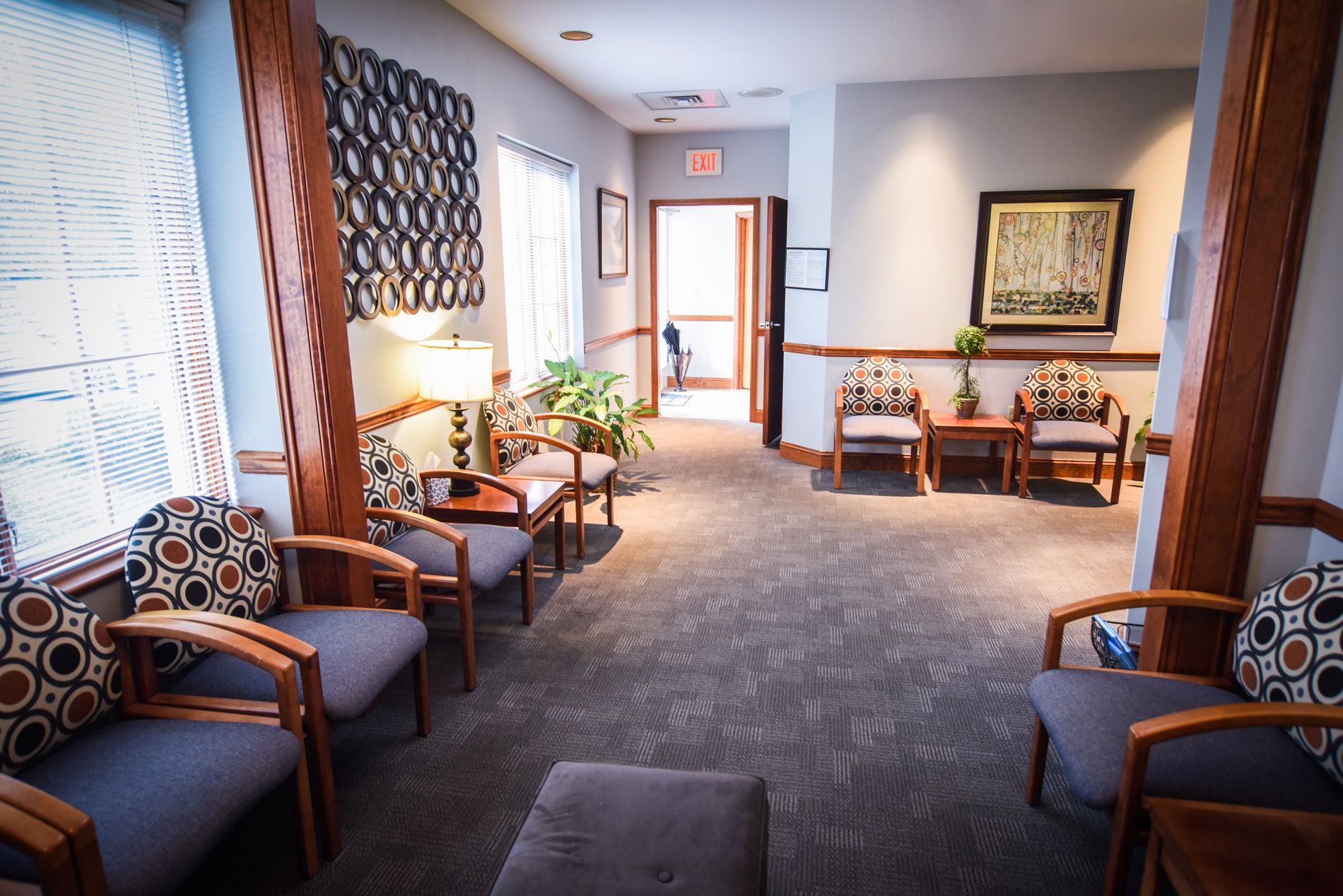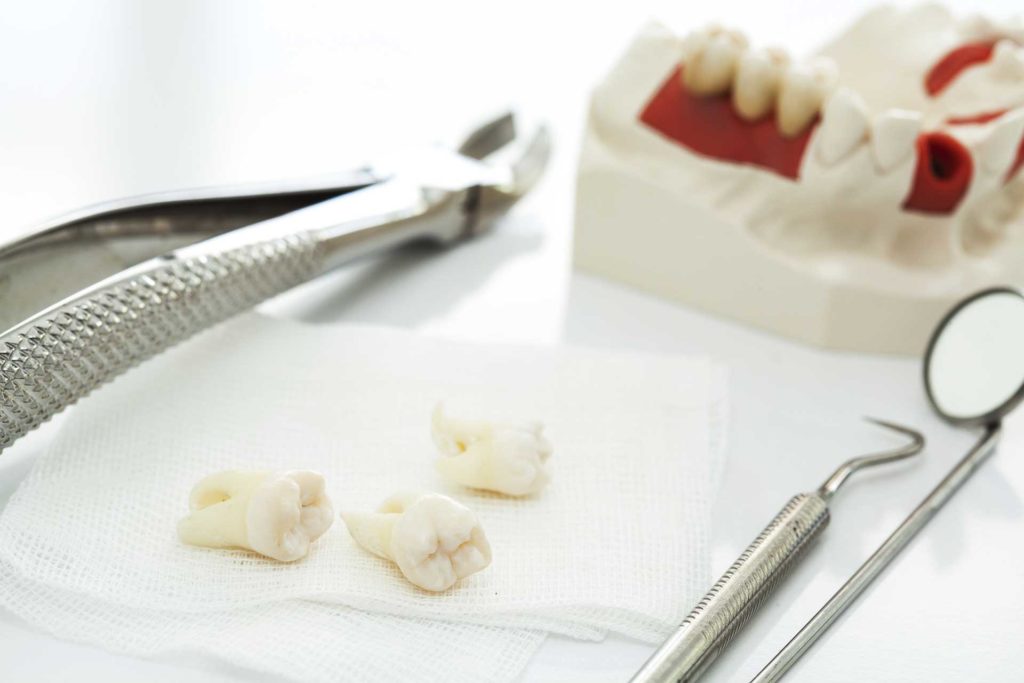Wisdom Tooth Removal
At Knoxville Oral & Maxillofacial Surgery, our surgeons can perform
safe and virtually pain-free removal of your wisdom teeth.
Wisdom Tooth Removal Is Virtually Pain-Free and Can Improve Your Oral Health
For many patients, wisdom teeth can cause severe pain and even lead to oral health problems if they are not removed.
At Knoxville Oral & Maxillofacial Surgery, our surgeons can perform safe, gentle wisdom tooth removal to protect your health and smile.
Why should you consider getting your wisdom teeth removed at our Knoxville, TN, practice?
Improved Comfort
We use local anesthesia and our doctors are also licensed by the Tennessee Board of Dentistry to safely administer IV sedation and general anesthesia. In addition, removing impacted wisdom teeth can provide relief from dental pain and other frustrating symptoms.
Restored Oral Health
When a wisdom tooth does not erupt properly, it can cause a range of dental health problems, including periodontal disease, sinus issues, inflamed gums, and cavities. The removal of these teeth can maintain the health of your smile.
Conservative Treatment
For many patients, removing the third molars can prevent future problems such as the need for more invasive and costly procedures. Your doctor can assess the position of your teeth and determine whether they need to be removed.
Jean Cavendar
5-Star Review from Google
Protect Your Smile
Take a look at what impacted wisdom teeth can do to your smile. Wisdom teeth removal is a common procedure, with about 85% of the population requiring this procedure because their mouths cannot accommodate more than 28 teeth.
Our oral surgeons can assess and determine if your wisdom teeth will affect the rest of your teeth or align with your smile.
Advanced Surgical Care Performed by Specialists
While some dentists may offer wisdom teeth removal and dental implants, there is no substitute for the skillset of an oral and maxillofacial surgeon. With the best interests of their patients in mind, many local doctors will refer their patients to us for their oral surgery procedures, including tooth extraction and the placement of dental implants. In addition to our fellowships in oral surgery, each of our oral and maxillofacial surgeons has undergone training in the safe administration of general anesthesia and IV sedation.
Turner P. Emery, DDS, MD
A native of Knoxville, TN, maxillofacial surgeon Dr. Emery attended dental school at the University of Tennessee College of Dentistry where he received his Doctor of Dental Surgery (DDS) in 2002. He then attended medical school and completed his general surgery residency and his residency in oral and maxillofacial surgery at the University of Florida College of Medicine.
Dr. Emery focuses on a number of maxillofacial surgery procedures, including the management and removal of impacted teeth, dental implants, hard and soft tissue grafting, facial trauma, corrective jaw surgery, management of oral pathology, and surgical management of TMJ dysfunctions.
Joshua S. Manuel, DDS
Dr. Manuel earned his Doctor of Dental Surgery in 2015 at the University of Tennessee Health Science Center in Memphis and his Bachelors degree in Microbiology and Business in 2011 at East Tennessee State University.
Dr. Manuel completed his surgical training at the University of Texas Medical Branch in Galveston, Texas. Dr. Manuel’s work in this residency program focused on the management of impacted teeth, complex orofacial infections, facial trauma, ablation of benign/malignant tumors, microvascular reconstruction, and nerve repair.
Request a Consultation
Schedule a one-on-one consultation with one of our Knoxville, TN, oral surgeons.
(865) 584-6207
Extracting Wisdom Teeth Is a Common Procedure
Do you need your wisdom teeth extracted? According to the American Association of Oral and Maxillofacial Surgeons, 85% of adults need to have their wisdom teeth extracted during their lifetime.
Top Reasons for Removing Wisdom Teeth
Few patients’ third molars erupt into the proper positions without any issues. For the majority of us, complications and damage to surrounding teeth are inevitable due to:
Limited Room in the Jaw
If you already have limited space in your jaws, an erupting wisdom tooth can cause your other teeth to shift, causing misalignment and sometimes reversing the results of orthodontic treatment.
Teeth Developing at an Angle
If your third molars are growing in at an angle rather than upright, they can cause damage to other teeth and the jawbone.
Partial Eruption
In some cases, partially erupted teeth can make proper dental hygiene difficult, increasing your chances of gum inflammation and cavities.
Trapped Teeth
When a tooth becomes trapped in the jaw, it is known as impaction. Without wisdom teeth removal surgery, impacted wisdom teeth can lead to cysts and infection. Fortunately, at our office, we perform all types of surgeries, including impacted wisdom tooth extractions.
Wisdom Tooth Removal Can Also Be Performed Preventatively
Prompt, effective wisdom teeth removal can prevent potential problems from developing in the first place. Your dentist may recommend extracting a wisdom tooth, even if you are not experiencing any issues. This practice is especially common with younger patients, as wisdom teeth may be harder to remove in the future, heightening the risk for complications. At our Knoxville, TN, practice, we will work with your primary dentist to ensure that you are receiving the best treatment for your needs.
“Painless procedures and quick recoveries. Couldn’t be more pleased. Highly recommend these oral surgeons.”
Robin H.
5-Star Review from Google
Reach Out to Knoxville Oral & Maxillofacial Surgery
We recognize the value of our patients and strive to provide the highest quality of care using the very latest in cutting-edge technology. Our team has a genuine concern for your well-being and overall health and is committed to providing you with a comfortable, safe, and relaxed environment. We are unconcerned with the volume of patients we see, as our approach to care focuses on taking our time so that we can give you the best results possible.
Whether removing a tooth or placing a dental implant, our doctors strive for nothing less than excellence. This not only ensures a stellar outcome for your procedure but also minimal recovery time. Our attention to our patients is why so many local dentists turn to us for tooth extractions and other oral surgeries.
To learn more about how we can protect your or your child’s dental health, contact Knoxville Oral & Maxillofacial Surgery online or call us at (865) 584-6207 today.
At Knoxville Oral & Maxillofacial Surgery, we strive to provide concierge-level service.
When Should the Wisdom Teeth Be Removed?
Wisdom teeth, also known as third molars, typically begin to erupt during the late teens and early adulthood. For most patients, they come in between the ages of 17 and 25. If there is not enough room for these teeth, complications such as impaction, discomfort, misalignment, and infection can develop.
Teenagers should have x-rays taken before these molars come in so we can determine if and when they should be removed. In most cases, an oral surgeon will recommend that wisdom teeth are removed by the time patients turns 25.
How Is the Procedure Performed?
Excess gum tissue may need to be removed to allow access to the wisdom tooth.
Specialized tools allow the surgeon to reach the tooth.
If the wisdom tooth erupts at an angle, it can damage surrounding teeth and cause cascading misalignment.
Wisdom Teeth Removal:
Consultation & Treatment
We perform simple and complex wisdom teeth removal procedures at our Knoxville office. Depending on whether the tooth is impacted or has completely erupted, your procedure may require more extensive oral surgery. After your initial x-rays are taken and we determine you are a good candidate, we can discuss your proposed treatment plan and schedule your surgery.
The Extraction Process
Our surgeons, Dr. Emery and Dr. Manuel, have refined their surgical technique to make these procedures as efficient as possible with very low risk of discomfort or complications. The procedure generally involves several steps:
Step One
We will administer the appropriate form of anesthesia and sedation. Your options include local anesthesia, IV sedation, and general anesthesia.
Step Two
If necessary, an incision is made in the gum tissue to access the tooth. In some cases, we will need to remove a small portion of the bone to access the area.
Step Three
The tooth is gently loosened and extracted. The wisdom tooth may be removed in one piece or in smaller pieces, depending on the degree of eruption and impaction.
Step Four
Once the molar has been extracted, we will place dissolvable sutures as needed to close any incisions and encourage healing.
Step Five
We will apply a small gauze pad to the treatment area and have you bite down to provide pressure to the area.
Step Six
You will return home to recover from the procedure. Be sure to follow our post-surgical instructions for faster healing.
Whether you undergo a simple or complex procedure, we will perform every portion efficiently, with your health and comfort in mind. When you undergo care at our state-of-the-art surgical center, we ensure that every aspect of your procedure is held to the highest standards. Our surgical suites are hygienic, equipped with the most advanced technology and tools, including various types of anesthesia, and have everything our surgeons need to provide you with safe, comfortable extractions.
“Dr Emery took out my wisdom teeth. It was my second procedure with him. The staff was very nice again and he did a great job! My recovery was short and I was able to get back to a fairly normal schedule in two days.”
Audrey Richards
July 13, 2017, 5-Star Review from Facebook
Your Recovery: What to Expect
Generally, patients need a few days to fully recover from the procedure. It is normal to experience swelling and discomfort for up to a week after treatment. These side effects begin to subside two to three days after your visit. Pain and swelling can usually be managed with over-the-counter anti-inflammatory pain medication and an ice compress. We may also prescribe medication to prevent infection and control any further pain.
Your surgeon will provide you with specific aftercare instructions you should follow to prevent infection, dry socket, and other complications from occurring.
Aftercare Instructions
To ensure proper healing, you should:
Eat Soft Foods or Liquids
Because your gums and the surrounding areas may be inflamed in the days after the procedure, it is important to be mindful of what you eat. Following surgery, you will need to stick with soft foods and liquids such as ice cream, yogurt, and smoothies.
Avoid Drinking from Straws
The suction from drinking out of a straw can loosen the blood clot that forms over a tooth extraction site, causing a condition known as dry socket. With dry socket, the underlying bone and nerves are exposed, resulting in intense pain and possible infection. In order to minimize these complications, you should not drink out of a straw for the first couple of weeks following your wisdom tooth surgery.
Maintain Good Oral Hygiene
Because keeping your mouth clean is essential to preventing infection, you should brush your teeth the night after surgery. However, do so cautiously. Additionally, you should try to avoid rinsing your mouth vigorously for at least a day or so in order to avoid dislodging the clot over the extraction site.
Rinse with a Saltwater Solution
After a day or so, you should gently rinse your mouth with a saltwater solution every few hours. This will help keep the surgical site clean and minimize the risk of infection.
Reliable, High-Quality Care
Knoxville Oral & Maxillofacial Surgery can provide the surgical care you need to maintain your health. Our surgeons are committed to helping you achieve your goals and will always serve your best interest. If you would like to learn more about our oral surgery services, call us at (865) 240-2977 or contact us online.
(865) 584-6207
Testimonials From Our Patients
We are proud to be able to provide our patients with access to first-rate surgical care, cutting-edge procedures, and an overall outstanding experience.
Dr. Emery did a fantastic job in providing tooth extraction and replacement with a dental implant. I had been anxious and he relieved my concerns immediately. He and his team provided a relatively pain-free experience and were available to answer all my questions quickly and professionally. I was so pleased with them that I took my daughter to Dr. Emery for her wisdom teeth extraction. We were both surprised at how well her pain had been managed and she never had to use opioids! If we need oral surgery again, we know where to go! Thank you, Dr. Emery, Dawn, Amanda, Meghan, Hannah, Wendy, and all the others!
- Lea Alexander
- Kenny Miller
Dr. Emery and his staff are so amazing. They really go the extra mile to make you comfortable and Dr. Emery’s bedside manner is like none I’ve ever seen before! He’s one of those doctors you hope you don’t have to go back to, but will be the ONLY one I do go to if it’s ever needed again. My only complaint is that he’s not in general dentistry because i wouldn’t be so terrified to go to a dentist if it was him. Great guy, great staff, great atmosphere!
- Allison Fritz
- Kari Hester
Our Office Locations
We have two office locations in Knoxville, TN.
West Knoxville Location
6207 Highland Pl Way, Ste 207
Knoxville, TN 37919
Directions
Hours: Mon - Fri 8:00 AM - 4:30 PM
Phone: (865) 584-6207
North Knoxville Location
2939 Essary Dr, Ste 1
Knoxville, TN 37918
Directions
Hours:
Mon - Fri 8:00 AM - 4:30 PM
Phone: (865) 240-2977
